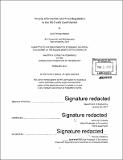Private information and price regulation In the US credit card market
Author(s)
Nelson, Scott Thomas
DownloadFull printable version (2.972Mb)
Other Contributors
Massachusetts Institute of Technology. Department of Economics.
Advisor
James M. Poterba.
Terms of use
Metadata
Show full item recordAbstract
Lenders typically learn new information about their borrowers over time but can be restricted from repricing debt in response to this information. I study a leading example of such re-pricing restrictions, the 2009 Credit CARD Act, to ask how such restrictions affect credit market efficiency. Using a near-universe of US consumer credit card account data as well as a large random sample of US consumer credit reports, I show evidence that the Act's restrictions had two competing effects: on the one hand, a decoupling between prices and default risk on existing loans over time, which engenders adverse selection through higher attrition of safe borrowers; on the other hand, lower markups on borrowers revealed to be inelastic, and hence lower price dispersion in the market overall. To quantify these two forces' net effect on market efficiency, I build a model of a competitive credit market with private information and changing borrower types over time, and I use the model to ask whether, and for whom, the Act's restrictions bring prices closer to an efficient benchmark of prices equaling marginal costs. While fully estimating the model remains a goal for future work, I here show preliminary results of how the model estimation is proceeding.
Description
Thesis: S.M., Massachusetts Institute of Technology, Department of Economics, 2017. Cataloged from PDF version of thesis. Includes bibliographical references (pages 33-36).
Date issued
2017Department
Massachusetts Institute of Technology. Department of EconomicsPublisher
Massachusetts Institute of Technology
Keywords
Economics.